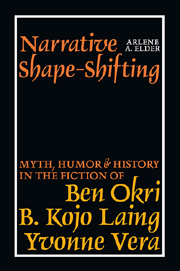 Narrative Shape-Shifting
Narrative Shape-Shifting Introduction
Published online by Cambridge University Press: 05 April 2013
Summary
In Yoruba Ritual, Margaret Thompson Drewal defines the term ase as ‘the power of performers to generate ritual spectacles, or rather spectacular rituals, that operate as style wars, for style is meaning and competing styles generate uniqueness, virtuosity, and inventiveness’ (27). The three novelists I study here, Ben Okri of Nigeria, B. Kojo Laing of Ghana and Yvonne Vera of Zimbabwe, while hardly at ‘war’ with each other, clearly demonstrate the ability of their variety of styles to communicate complementary meanings while revealing their artistic individuality. All three write about their own regions and of particular periods in the experiences of their countries and peoples, yet, while they criticise similar social and political problems in their colonised, and then, newly independent nations, they envision solutions not for Nigeria, Ghana or Zimbabwe alone, but for the entire continent, even the world. Okri's interpretation is spiritual, Laing's a symbiosis of the most progressive ideas from tradition with the most humane from modernity, Vera's a trust in the validity of ‘re-memory’ as truth-telling and in the potential of eco-communialism to create a better world. While all three recognise the agency of politicians, none places the burden of progress on political ideology or leaders alone, but rather on the enlightenment of individuals, ordinary people, who themselves will create just societies.
- Type
- Chapter
- Information
- Narrative Shape-ShiftingMyth, Humor and History in the Fiction of Ben Okri, B. Kojo Laing and Yvonne Vera, pp. 1 - 6Publisher: Boydell & BrewerPrint publication year: 2009


